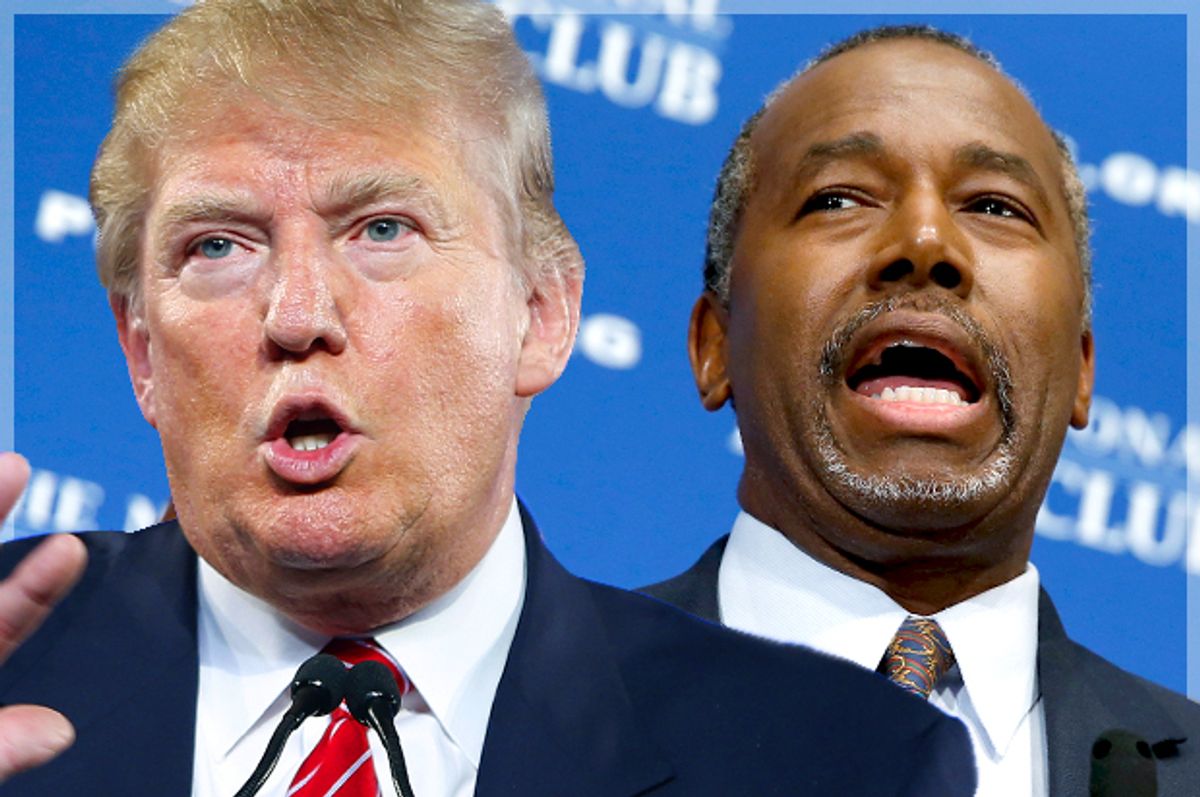There were a lot of lies thrown around in the fourth GOP debate. Jeb Bush claimed Christians in Lebanon are beheaded (41 percent of Lebanon's citizens are Christian, and the country is a parliamentary democracy). Marco Rubio insisted "we have a president that treats the prime minister of Israel with less respect than what he gives the ayatollah in Iran" (the day before Rubio made these remarks Obama met with Israeli Prime Minister Netanyahu in the White House).
China was an object of particularly intense scorn, however. All the candidates did was lie about it.
Speaking of Syria, Ben Carson claimed "the Chinese are there, as well as the Russians." No, the Chinese are not in Syria; that is a flagrant lie. The Chinese government has explicitly denied that it is involved in Syria, and has dubbed reports that claim otherwise "speculative nonsense."
Moreover, Trump accused China of being "the number one abuser of this country." When he was asked about the Trans-Pacific Partnership (TPP), Trump rambled on, warning that China was going to take advantage of it... until Rand Paul pointed out a complicating factor: China is not even part of the TPP.
The U.S. presidential candidates didn't let pesky facts get in the way of their baseless fearmongering, nevertheless.
Rubio joined Trump in warning that "the Chinese are taking over the South China Sea." (Trump also complained "nobody talks about" North Korea, which is in news headlines nearly every week.) Kasich insisted "China doesn't own the South China Sea." No, it certainly doesn't -- but the U.S. does?
The candidates, at the prodding of the moderator, also fearmongered about alleged Chinese "cyber attacks" and hacking. Such "cyber attacks" are a recurring motif among jingoistic soothsayers, but they are hardly based on reality.
For starters, much of the media reporting on these supposed attacks often jumps to conclusions without much evidence. American computer security specialist Bruce Schneier notes that the "popular media narrative is that there is a coordinated attempt by the Chinese government to hack into U.S. computers -- military, government, corporate -- and steal secrets. The truth is a lot more complicated."
"There certainly is a lot of hacking coming out of China. Any company that does security monitoring sees it all the time," Schneier says. However, "they can't prove that it comes out of China," he adds. Furthermore, "these hacker groups seem not to be working for the Chinese government."
James Andrew Lewis, a senior fellow and director of the technology and public policy program at the Center for Strategic and International Studies, also writes "We are not in a war — cold, cool or hot — with China in cyberspace. There have been none of the threats, denouncements or proxy conflicts that characterize a cold war. In fact, the administration appears to have omitted any mention of the Chinese military in recent high-profile speeches on Chinese hacking."
"'Cyberattack' is one of the most misused terms in the discussion of Chinese hackers," Lewis explains. "With very few exceptions, China has not used force against the United States in cyberspace. What it has been doing is spying."
"China is no more likely to launch a cyberattack on American infrastructure than it is to launch a missile at us," Lewis continues. "It has no interest in provoking a war it couldn’t win or in harming an economy it depends on."
And, after all, "America spies on China, too, so what can we complain about?"
The supposed "threat" China poses is greatly exaggerated. It is in the interest of the GOP, which overtly fetishizes American empire and military power, to hyperbolize this alleged danger.
Empires thrive when they have a threat. In fact, they often define themselves in opposition to that supposed threat (e.g., "We are the land of freedom; they are the land of tyranny"). With the collapse of the Soviet Union, China -- as a growing superpower with a population over four times larger than that of the U.S. -- is increasingly becoming Public Enemy No. 1.
When it came to China in the debate, it was a free-for-all. The GOP expected their audience to know nothing about the country, so they simply spewed baseless rumors about it. Right-wing populists frequently rely on such baseless myths to scare voters into supporting increasingly militarist policies, wielding fear as a weapon.

Shares